The way we use the internet is deeply changing. This change is mainly about how we develop software and how we interact with AI ecosystems. The brand new buzzword for this is “Web 4.0,” but many are starting to call it Agentic Web instead.
And what’s the main tech leading this shift? AI agents.
The global AI agent market is on the rise. It is projected to reach $50.31 billion by 2030, driven by the growing adoption of AI across various industries. This comes as no surprise, as this tech allows you to easily build intelligent virtual assistants powered by AI, instead of relying on fixed-response bots.
In this article, we’ll break down what a good AI agent builder is in various use cases, helping you choose the right one for your unique needs. You’ll learn how they stack up, what makes them different, and how to choose the right one based on your goals.
Build the best AI agents for your business with Lyro
What are AI agent builders and how do they work?
AI agent builders are tools that let companies create their own custom AI agents and AI chatbots to automate tasks, enhance decision-making, and improve efficiency across various industries.
They also don’t require a developer to set up. Non-technical users can create, test, and deploy custom AI agents fast, using intuitive, no-code platforms.
That’s a big deal for small and mid-sized businesses. AI agents have been reported to significantly improve productivity (66%), cost efficiency (57%), and decision making (55%).
Custom AI agents understand context and solve problems proactively, while easily connecting with your existing systems. Their tasks range from answering support queries to booking appointments or handling order updates. Here’s an example of Tidio’s Lyro AI agent helping a customer:
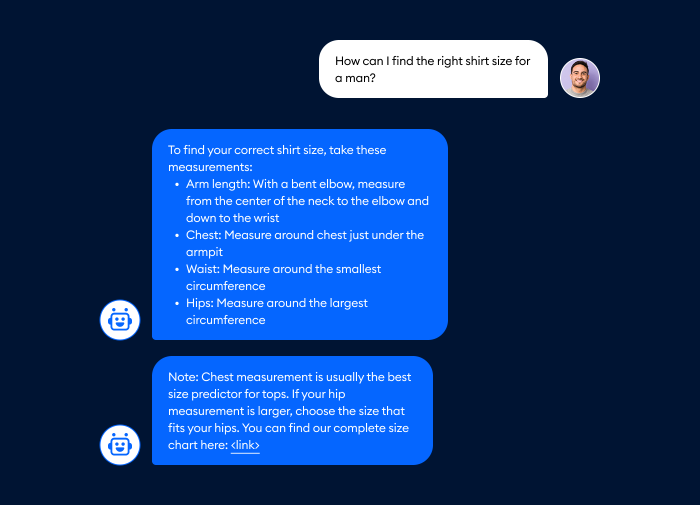
Unlike simple chatbots, custom AI customer service agents can:
- Understand natural language
- Pull real-time data from multiple systems
- Make decisions based on rules or context
- Learn and improve over time
For example, a Shopify store can use an AI agent to handle “Where’s my order?” queries by pulling shipping data and replying in real time, without human intervention.
Gartner predicts that by 2029, autonomous AI agents will resolve 80% of common customer service issues without human intervention, leading to a 30% reduction in operational costs. This is an enormous benefit for companies looking to cut costs and improve their customer service strategy in a single strategic move.
And while we’re in the benefits area, let’s see what else no-code AI agent builders can bring to the table.
5 key benefits of using an AI agent builder
AI agent builders simplify the creation and management of these agents. You get pre-built blocks and logic nodes that let you design intelligent help desk workflows fast, with quick and easy implementation.
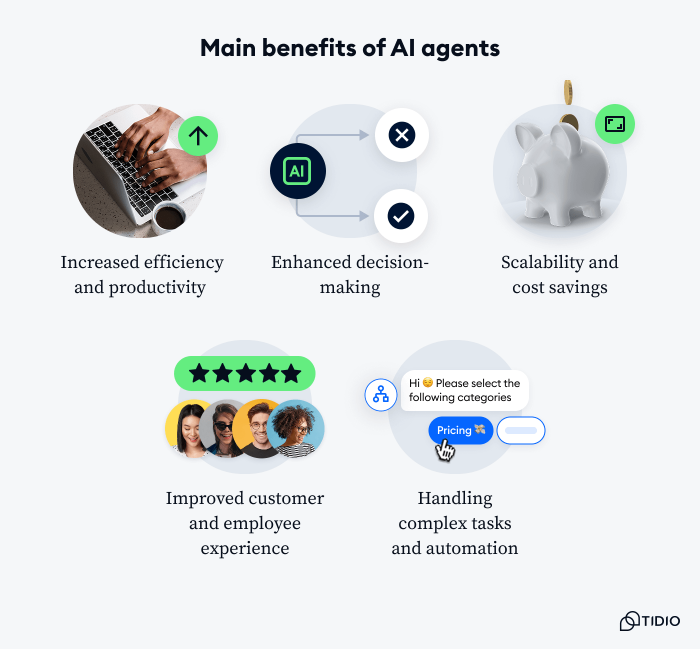
1. Increased efficiency and productivity
AI agents don’t sleep. They handle repetitive tasks, can act like FAQ chatbots, but also, aside from resolving routine support requests 24/7, they can be proactive and score leads, too. This means your human agents focus on high-value work.
Read more: Learn how to use chatbots for lead generation to boost your sales.
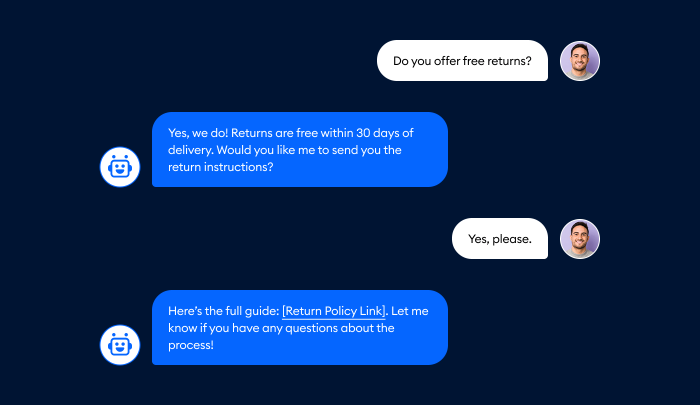
McKinsey claims that autonomous AI agents can automate up to 70% of business activities in customer service and support roles. However, there already are outliers. The best example is Cove Smart deploying the Lyro AI agent and reducing response times by 80%. Their resolution rates also increased by 70%, with customer satisfaction going up by 35%.
2. Enhanced decision-making
AI agents can access data from CRMs, order systems, and knowledge bases. This enables them to make context-aware decisions instantly. Gartner reports that AI-powered decision-making tools can improve accuracy and speed by 33%, especially when pulling from complex data sources. At least 35% of companies are using AI to speed up decision-making and make it more accurate. This number is likely to increase.
For example, if a returning customer asks for an invoice, the AI agent can fetch their history and send it without involving a rep.
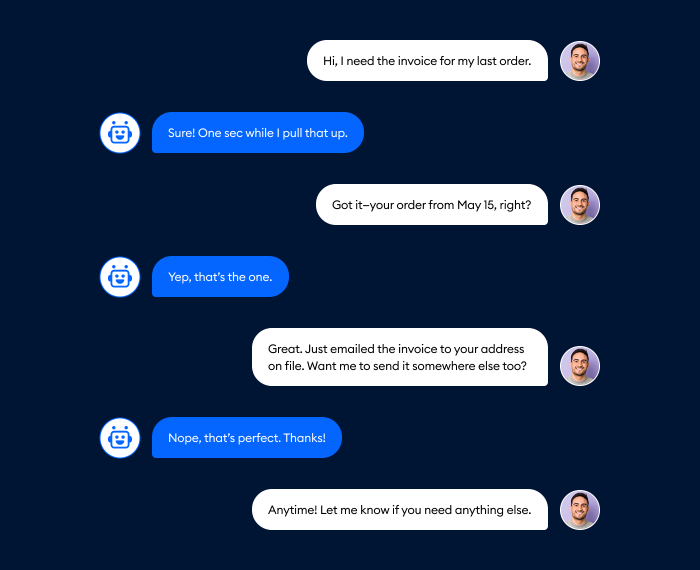
3. Scalability and cost savings
As you grow, your customer inquiries increase. AI agents scale without needing more headcount. You get consistent service at a fraction of the cost. The adoption of autonomous AI agents leads to a 35% cost reduction in customer service operations and a 32% revenue increase.
A great real-life example would be Gecko Hospitality. The company deployed Tidio’s Lyro AI agent and reached 90% customer service automation while scoring over 257 leads from chatbots alone over 6 months.

4. Improved customer and employee experience
Faster, smarter responses improve the customer journey. Agents no longer feel overwhelmed by repetitive queries and can focus on complex cases. According to Salesforce, 68% of customers say AI improves their overall service experience, especially when it resolves their issue on the first try.
This results in faster onboarding, lower churn, and higher CSAT scores. Customers get help immediately, and agents do more rewarding work. A great example is Wulff Beltton, a company that achieved a consistent customer satisfaction rating of 4.5/5 after switching to Tidio chatbot automation.
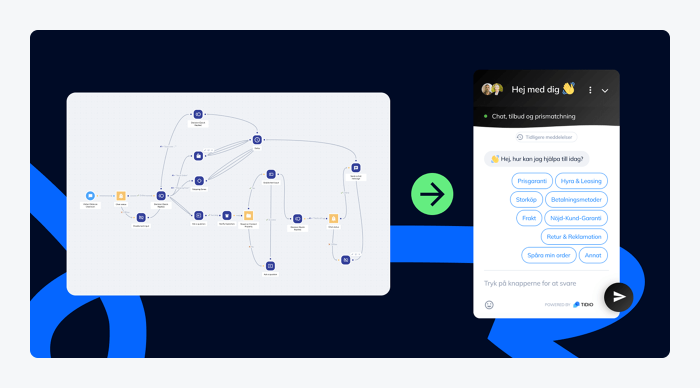
5. Handling complex tasks and automation
AI agents are no longer limited to pre-set scripts. With memory, data access, and logic branching, they can automate complex workflows. By 2026, autonomous agents based on conversational AI deployments within contact centers will reduce agent labor costs by $80 billion.
For example, numerous Tidio clients use Lyro AI agent to score leads, perform sales and upsells, all via chat.
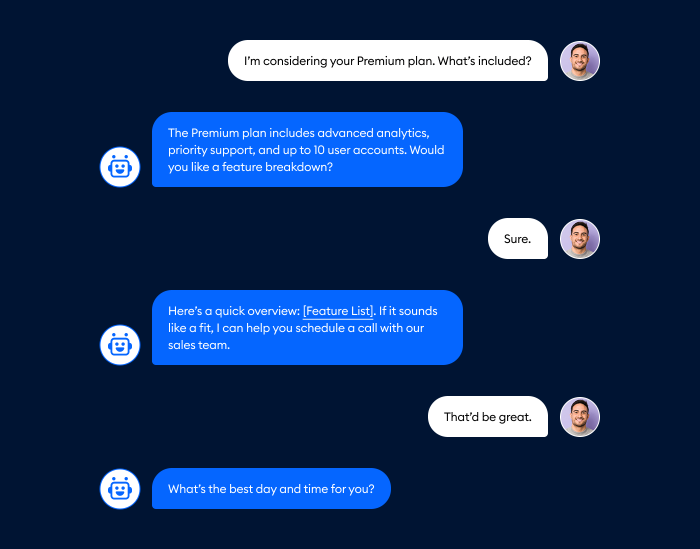
Top 5 AI agent builder platforms
The AI agent builder market is growing fast, with dozens of platforms offering different strengths. Some focus on ecommerce, others on enterprise-grade automation. Multilingual support and voice interactions are also covered.
The challenge is finding the tool that fits your team’s workflows and growth plans. In this section, we break down the top platforms that consistently deliver the best mix of AI agent and chatbot features, as well as real-world performance based on customer feedback and market adoption.
| Name | Rating | Free plan? | Best for |
| Tidio | 4.7/5 ⭐️ | ✅ | Custom AI agents and NLP chatbots |
| Vertex AI Agent Builder | 4.3/5 ⭐️ | Free Trial available | AI agents with deep Google Cloud integration |
| Ada | 4.6/5 ⭐️ | Free Trial available | Automated customer support |
| Salesforce Agent Builder | 4.3/5 ⭐️ | Free Trial available | AI agents within the Salesforce ecosystem |
| Voiceflow | 4.7/5 ⭐️ | ✅ | AI-powered chat and voice agents |
1. Tidio
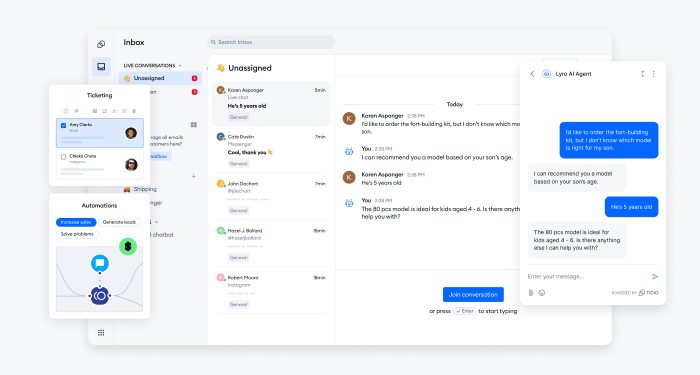
Ratings: 4.7/5 ⭐️ (1,750+ G2 reviews)
Tidio is an all-in-one customer service platform that combines multilingual live chat, help desk ticketing systems, and AI-powered customer service automation to help businesses deliver faster, more efficient support. It’s designed for small and mid-sized teams looking to scale without adding headcount, thanks to its no-code AI agent builder. Tidio makes it easy to centralize customer communication across channels and automate repetitive tasks without sacrificing a personal touch.
Its standout feature is Lyro, an AI chatbot that can resolve up to 70% of customer inquiries automatically. Users can also build custom AI agents, automate conversations, and connect the platform with tools like Shopify, WordPress, and Messenger to deliver seamless support.
Main features:
- No-code AI agent builder for custom automation
- Lyro AI agent for conversational AI customer service
- Unified inbox for live chat, email, and Messenger
- Pre-built templates and integrations (Shopify chatbots, WordPress chatbots, and more)
- Automated ticketing system with prioritization and workflow automation
Pricing:
- 7-day free trial available
- Free version available
- Starter ($24.17/mo)
- Growth (starts at $49.17/mo)
- Plus (starts at $749/mo)
- Premium (starts at $2999/mo)
Build the best AI agents for your business with Lyro
2. Vertex AI Agent Builder
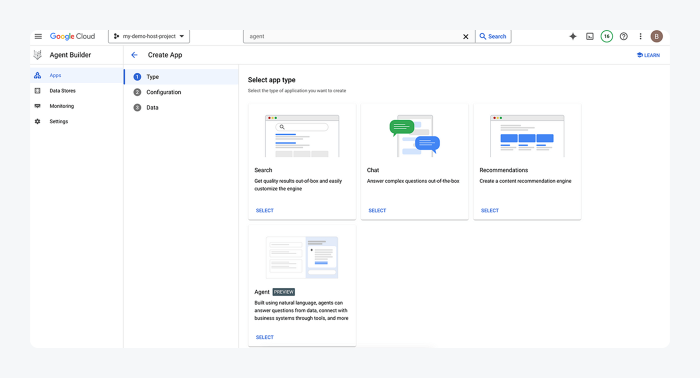
Ratings: 4.3/5 ⭐️ (570+ G2 reviews)
Vertex, the Google Cloud Agent Builder, is a low-code tool designed to help businesses create advanced AI agents powered by Google’s latest models. It integrates smoothly with Google Cloud services and allows teams to build and deploy agents for customer support or internal automation, without needing deep machine learning expertise. It’s ideal for teams that want flexibility and seamless AI integration in one ecosystem.
Users can build agents using natural language prompts and connect to tools like Vertex AI, BigQuery, and Dialogflow. It’s designed for fast iteration and scalable deployment, whether you’re building a simple chatbot or a complex multi-turn support agent.
Main features:
- Prompt-based agent creation
- Workflow orchestration
- Vertex AI integration
- Multi-channel deployment
- Security and compliance tools
- Free Tier: Yes but limited usage quotas
- Pay-as-you-go
- Enterprise plans: custom pricing
- Free trial: $300 in credits is available for new users
3. Ada
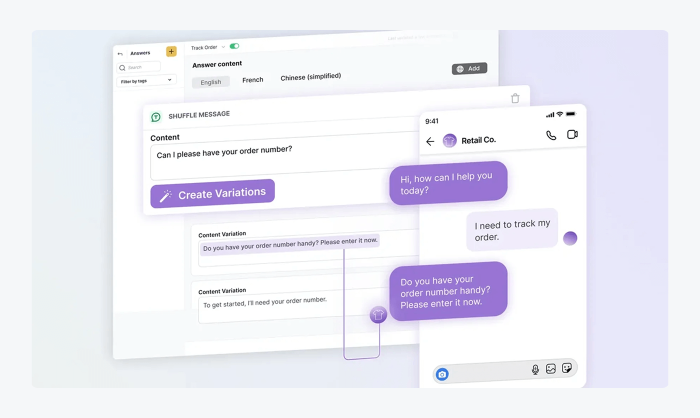
Ratings: 4.6/5 ⭐️ (154+ G2 reviews)
Ada is an AI-powered customer service automation platform designed to help businesses deliver personalized, efficient support at scale. With Ada, companies can automate customer interactions across various channels, ensuring consistent and high-quality service around the clock. The platform offers tools to customize AI agent behavior and integrate with existing systems. It allows for continuous performance improvements through analytics and coaching features.
Main features:
- Generative AI
- Omnichannel support
Customizable agent persona - Multilingual capabilities
- Performance analytics
- Free Trial: yes
- Scalable plans: between $4,000 and $64,000
4. Salesforce Agent Builder: Agentforce
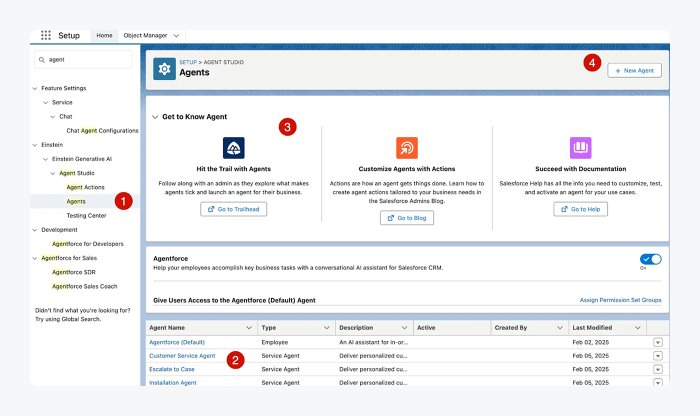
Ratings: 4.3/5 ⭐️ (90+ G2 reviews)
Agentforce is a low-code platform that enables businesses to create and customize AI agents tailored to specific roles and use cases. By leveraging existing Salesforce tools like Flows, Apex, and MuleSoft APIs, users can define agent behaviors using natural language instructions and set guardrails to ensure agents operate within desired parameters. The platform also offers features like Plan Tracer for testing agent responses and seamless human handoff capabilities when agents encounter queries they can’t resolve.
Main features:
- Plan tracer
- Human handoff
- Prompted actions
- Workflows
- Apex classes
- Flex Credits: $500 for 100,000 credits; one Agentforce action consumes 20 Flex Credits ($0.10 per action)
- Per Conversation: Starting at $2 per conversation, with volume discounts available for high-usage customers
- Platform Starter: $25/user/month (billed annually)
- Platform Plus: $100/user/month (billed annually)
- Free Trial: Yes, for new users
Read more: See how Zendesk and Salesforce compare to each other as CRM solutions.
5. Voiceflow
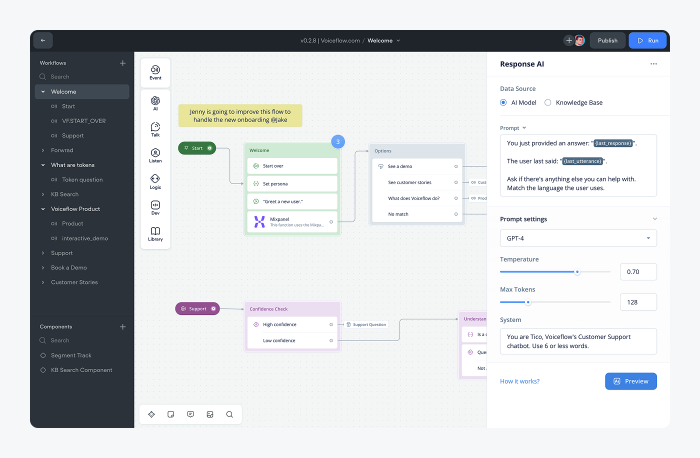
Ratings: 4.7/5 ⭐️ (50+ G2 reviews)
Voiceflow is a collaborative platform designed for teams to build and deploy AI agents for both chat and voice interactions. It offers a visual interface that allows users to create complex conversational workflows without coding, while also providing advanced customization options for developers. This tool’s flexibility makes it suitable for a wide range of applications, from customer support to internal process automation.
The platform supports integration with various tools and services, enabling AI agents to access and utilize external data sources effectively. Teams can work together in real time, streamlining the development process and ensuring consistency across projects.
Main features:
- Workflow builder
- Knowledge base integration
- API and function support
- Real-time collaboration
- Multi-channel deployment
- Starter: Free
- Pro: $50/month
- Team: $125/month
- Enterprise: Custom
- Free trial: A 7-day free trial for the Pro and Team.
How to choose your AI agent builder
Not all AI agent builders are the same. Some focus on ease of use, others on integrations or flexibility. Choosing the right one depends on your team’s technical skills and budget, but also the complexity of your support workflows.
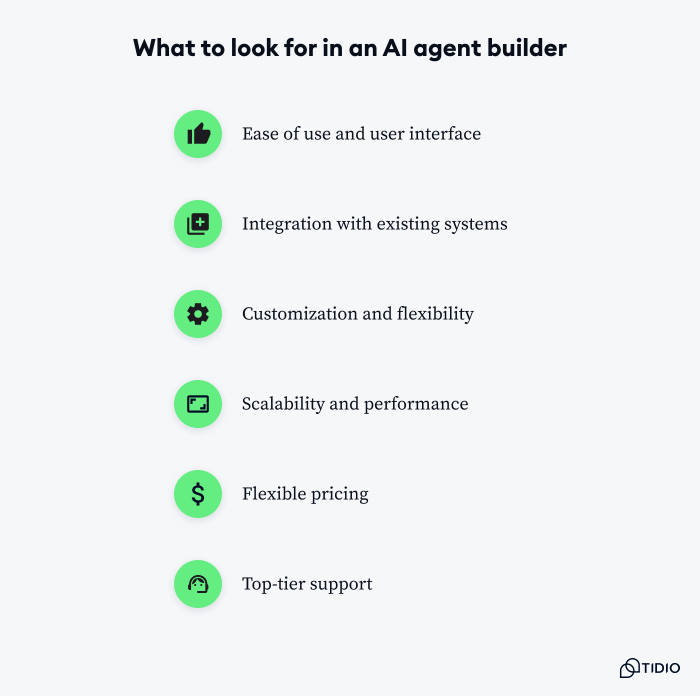
Here are the key factors to consider:
1. Ease of use and user interface
If your team isn’t too technical or you want quick and easy integration, look for no-code tools with visual builders and drag-and-drop logic. GlobeNewswire reports that 95% of companies use low-code/no-code solutions. This is why the best platforms let anyone build agents in hours, not days.
Tidio, for example, uses a block-based AI agent and chatbot builder where you define steps like “Ask for user’s email,” “Search knowledge base,” and “Reply with results.”
2. Integration with existing systems
Your AI agent should plug into your CRM, help desk, website, and any internal data sources. Look for native integrations with tools like Shopify, Zendesk, HubSpot, or your internal APIs via webhooks.
If an AI agent can’t access your systems, it can’t deliver accurate responses. This breaks the trust of your users.
3. Customization and flexibility
Some platforms offer rigid templates with limited options. Others let you build multi-step logic, manage variables, and use memory.
You’ll want control over how your agent behaves and when it escalates to a real person agent. Especially if you’re building agents for unique use cases like troubleshooting or upselling.
Read more: Check out critical tips on ticket escalation to better automate your support.
4. Scalability and performance
As usage grows, your agent must support higher volume without performance drops. Check how the platform handles concurrency, how fast it responds, and whether it supports global deployments.
Cloud-native, multilingual chatbots and AI builders tend to perform better under load and ensure faster replies. Deloitte reports that latency under 1 second in customer-facing AI agent apps increases satisfaction by up to 20%. Speed does matter.
5. Flexible pricing
Always look for transparent pricing. Go with platforms that charge based on agent volume, messages processed, or monthly active users. Avoid hidden fees for integrations or training modules. In fact, unclear pricing models for AI tools are a top reason for adoption delays among SMBs. And understandably so, as it’s only natural that you want to know exactly what you get for the money you invest.
Tidio, for instance, offers transparent and scalable pricing plans, with a free plan for new users to allow them to see the benefits with no high costs upfront. And the scalable pricing model is ideal for small and growing teams.
6. Top-tier support
You’ll need help building your first agent, integrating systems, or debugging edge cases. Look for platforms with responsive support, documentation, live chat, or even onboarding specialists. According to G2, platforms with 24/7 support see 40% higher customer retention than those with limited assistance.
How to create an AI agent in 6 simple steps
Once you choose a platform, building your AI agent follows a predictable process. Most builders follow the same logic structure.
Here’s how to do it:
1. Define the agent’s scope
Before you build, define what your AI agent will do. Keep the scope narrow. A focused agent performs better and is easier to manage. Start with a single goal, like answering order status questions and booking demo calls. This makes it easier to test and improve performance without overwhelming your users or your team.
Read more: Find out how Tidio’s AI Agent Lyro achieved the best resolution rates in the industry.
2. Choose a platform
Next, pick a platform that fits your technical comfort and business needs. If you want a no-code solution that is easy to implement and scale up, go for an AI agent builder like Tidio. Tidio’s AI agent Lyro is great for both SMBs and enterprise chatbots as it can handle high-volume support, but it’s also widely used by teams on a smaller scale. Tidio integrates easily with your existing systems and gives you flexibility in user interface design.
3. Create instructions and variables
Once you have your platform, start building your agent’s logic. Define the live chat triggers (i.e., what kind of message or user action will activate the agent) and then map out what the agent should do. For example, if someone asks about shipping, the agent could ask for an order ID, fetch the order details via API, and return the tracking status.
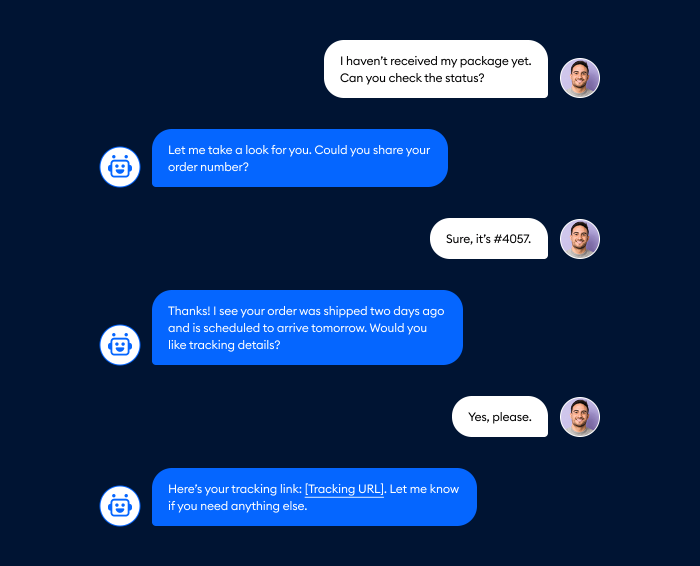
Use variables to store key info like name, email, or product preferences. Most platforms use modular blocks or “autonomous nodes” to build this logic step-by-step.
4. Integrate the agent
To make your AI agent useful, connect it to your existing systems. Integrate with your CRM like HubSpot or Salesforce, your help desk tools like Zendesk or Intercom, and your knowledge bases such as Notion or HelpDocs. Don’t forget to hook it up to messaging channels like live chat, WhatsApp, or email, and use APIs and webhooks to automate backend tasks. A well-integrated agent can respond with accurate, personalized data in real time.
Read more: Learn all about easy and effective AI chatbot integration.
5. Test and iterate
Testing is critical before launch. Go through the full flow from a user’s point of view and identify edge cases where the conversation might break or the response might fall short. Ask your team for feedback on the logic and tone. Watch for fallback messages, where the agent doesn’t know what to do, and decide when the issue should be transferred to a human agent.
6. Deploy and monitor
Once the agent performs reliably, it’s time to deploy. Publish it across your main customer touchpoints. Use built-in analytics to track usage, resolution rates, repeat questions, and time saved. Monitor its performance over time and adapt based on what users actually need.
Tidio AI agent builder checks all the boxes
Tidio is one of the easiest AI agent builders for non-technical teams. With no-code tools, fast setup, and deep ecommerce integrations, it’s perfect for small and growing businesses.
You can:
- Train agents on your knowledge base and always achieve high levels of accuracy
- Automate up to 70% ff support tasks
- Offer 24/7 assistance across all support channels
- Scale up your team with cost-effective pricing
With Tidio’s Lyro AI agent, the implementation process is quick and intuitive. Lyro’s easy-to-use platform and flexible features help you easily configure your AI agents to meet your unique needs.
Start building AI agents in minutes. No coding needed.
Choose the right AI agent builder platform for your business

